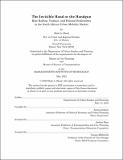The Invisible Hand or the Handgun: Ride Hailing, Violence, and Political Settlements in the South African Urban Mobility Market
Author(s)
Ebeid, Ehab A.
DownloadThesis PDF (675.7Kb)
Advisor
Jackson, Jason
Terms of use
Metadata
Show full item recordAbstract
Markets are thought to constitute a force that fosters peace and brings both material and non-material improvements to society. Technology and innovation are similarly believed to offer developmental promise. The spread of ride hailing platforms such as Uber to developing country contexts is conceived of as a market formalization tool that produces desirable social outcomes, reducing unemployment while creating modern and efficient transportation systems. Why, then, do we see violence as a central, persistent feature of ride hailing markets in the developing world?
To understand violent conflict in urban mobility markets, I conducted semi-structured interviews with drivers, policymakers, platform executives, activists, and other industry actors in Gauteng, South Africa, the province that encompasses the cities of Johannesburg and Pretoria, and one of the earliest and largest ride hailing markets in the developing world. Relying on theoretical frameworks from new institutional economics and critical legal studies, I show that violence plays an important role in market governance. Violence on the part of taxi associations is embedded in the market’s informal institutions and constitutes an enforcement mechanism that underpins the territorial norms that market actors understand as ‘laws’.
I explain the emergence and persistence of market violence as the result of a mismatch between the distribution of power and the distribution of benefits among market actors, engendered by ride hailing’s entry. To better explain how the market is governed and contested, I propose a more precise typology of power and legitimacy, and clarify the sources of power belligerents rely upon to survive and prevail in conflicts. Finally, I use the contrasting fates of two ride hailing services, Uber Bus and Uber Go, to illustrate how groups deploy power to contest the market, and how regulatory decisions go beyond traditional market considerations.
By studying a market characterized by both old and new forms of violent conflict, this thesis inserts violence into literatures on markets, which largely ignore conflict; and applies the macro-institutional political settlements framework to the meso level of a specific market. As policymakers contend with the spread of ride hailing firms, a broad and empirically based view of how they are organized, governed, and how they function in different contexts is needed, to better understand how to regulate them.
Date issued
2022-05Department
Massachusetts Institute of Technology. Department of Urban Studies and PlanningPublisher
Massachusetts Institute of Technology